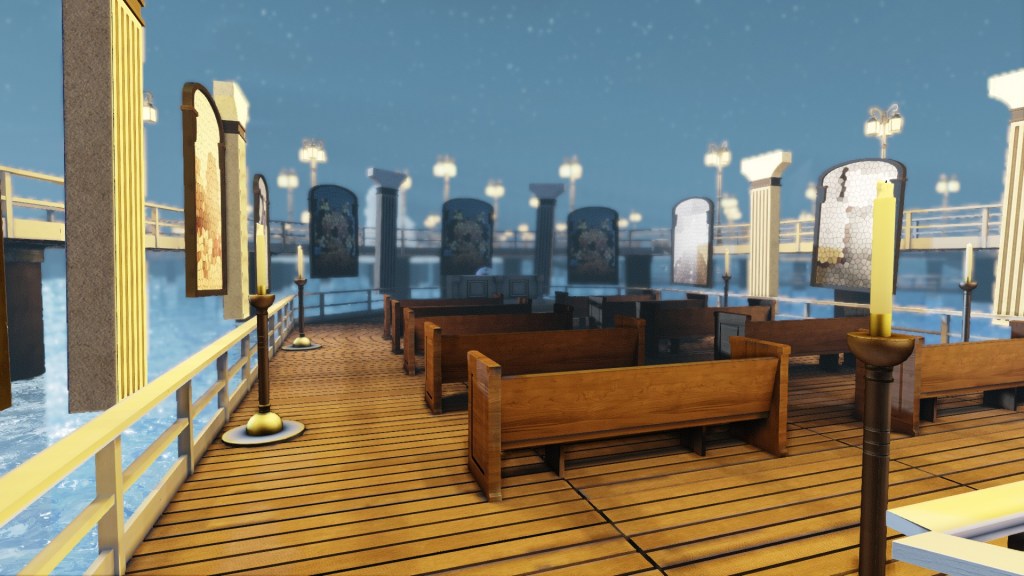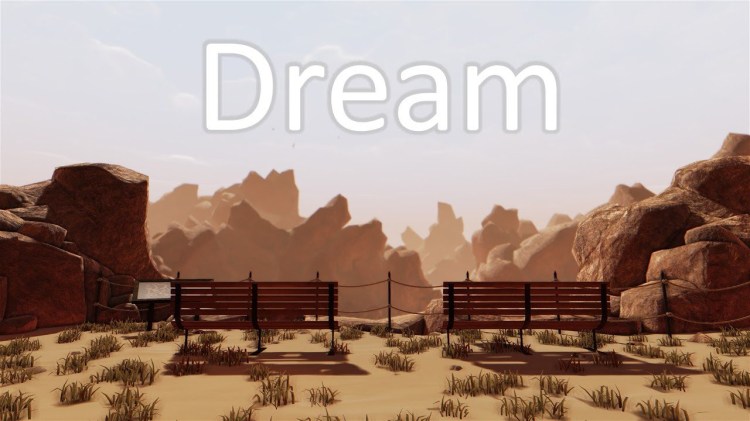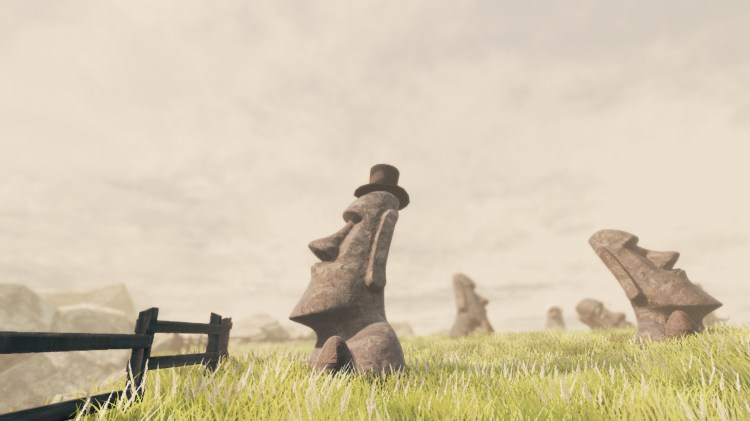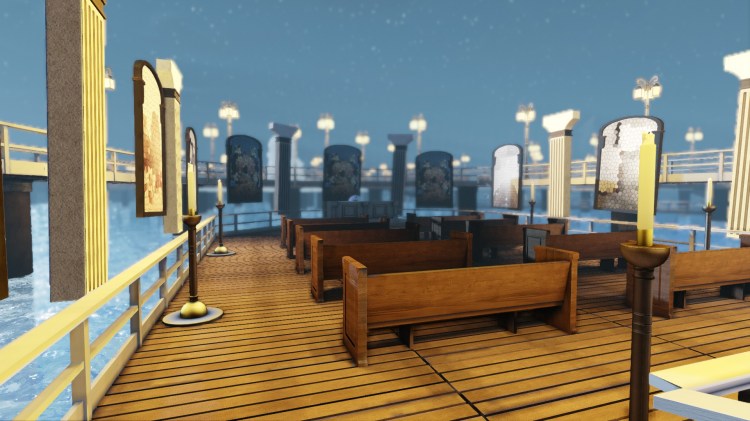Platforms: PC
Reviewed On: PC
Developer: HyperSloth
Publisher: Mastertronic
Singleplayer: Yes
Multiplayer: No
No game that has been in Early Access for several years before finally getting a proper should greet me with a polite note in the options menu informing me that the key rebinding labels don’t work properly and that may need to alter them by going into the game’s files. My relationship with Dream didn’t exactly get off on the right foot, it’s fair to say, and after several hours of playing I’m left with a feeling that this game could have been a lot better than it was, and that I honestly don’t know what to say about it.
That’s not a slight on the game…well, it is, but we’re getting to that. Dream is simply a game where there isn’t too much going on to actually talk about, and one where talking about it too much would really be entering into spoiler territory. As a first-person exploration game the focus is on visual and audio experience, and to describe it too much would ruin the entire idea of exploration. But the very core of the matter is that while I found Dream’s premise to be an intriguing one, the game itself just didn’t interest me, and those are the very worse kind of games to write about. A game that you love or hate is easy to talk about as both of those things manifest as a type of passion, but dull games…well, they’re tricky. They don’t spark any kind of passion, and there’s only so many ways that you can say something is sort of okay.
You inhabit the body of one Howard, a young-looking lad with a voice that makes him sound older than he actually is. Living in his deceased uncle’s house Howard is unsure of where his life is going or what he wants to do. The house is a constant reminder of his beloved uncle who was a seemingly highly talented author owing to the many awards scattered around the place. Howard’s days are tedious and uninteresting to him, and his parents are becoming more worried by his stagnation with every passing moment, but at night he experiences powerful lucid dreams that are so powerful he finds little joy until his eyes close and dreams take him. The idea is to explore Howard’s dreams and occasional harrowing nightmares, solving the puzzles that bar your progress, and thus build up a picture of who Howard is through his fears, desires and mindscape. Although at first glance it’s easy to toss Dream into the pile of fairy generic, so-called “walking simulators” clones that pervade Steam at the moment the game fights to be free of that label by tossing in a jump button which proves mostly pointless and puzzles. To put it bluntly, it has actual gameplay mechanics that extend beyond merely walking, even going so far as to introduce usable items into the mix, although they never actually need to be used to complete the game. As a genre, although whether it’s a genre in its own right is a debatable point, I’m perfectly happy with walking simulators, figuring that done correctly they can provide some fascinating experiences. But in the case of Dream it’s interesting to see how the developers have seemingly tried to avoid potential backlash by throwing in more traditional gamey ideas.
More than anything this is a look at the idea of lucid dreaming, which is to say the ability to understand that you’re in a dream and therefore exert a degree of control, and the reading of dreams, a fascinating concept wherein people believe that certain recurring and common themes and motifs within dreams can provide insight into an individual’s deepest feelings and thoughts. To this end the developer has tossed in collectible pages which provide brief summaries of what certain things are thought to mean, thus letting you try to read Howard’s dreams in order to gain some insight into who he is and where he might be going in life. At least, that seems to be the idea behind the game; a slow discovery of who Howard is before culminating in one of three endings, but frankly what Dream presents is a fairly dull and lifeless examination of Howard as a person, not helped by the stilted voice acting that comes across as though the actor is trying to read from cue cards. Howard’s dreams are really basic, surface looks at his personality that are explained entirely by the collectible pages, broken up by decent by drab puzzles like having use a conveyor belt to deliver the correct food to a series of huts. Given the creative freedom that dreams can allow this is an often remarkably quiet and straightforward game in its visuals, environments and puzzles. However, in the interests of fairness most dreams, at least my own ones, do actually tend to be quiet subdued, often portraying seemingly normal environments and situations in which slightly or very odd things can and do occur, so in this sense Dream is a relatively accurate representation of…eh, dreams.
That doesn’t stop me from wishing there was just more going on, though. I find the game’s premise absolutely fascinating, but the execution feels so empty. Each of the dream locations you explore are initially sort of pretty to look at, letting you amble through the likes of a desert, a green meadow and some sort of tropical resort, but they quickly lose their luster as they lack much in the way of visually interesting things to discover, stuff to find or things to do. As glimpses into Howard’s psyche and his underlying identity crisis I find them shallow. However, I can’t rule out the possibility that it is simply a case of me personally failing to read the environments adequately, as despite finding the concept of using dreams to learn more about oneself intriguing I’ve never been able to glean much meaning from my own nocturnal outings. Furthermore even thought I was delving into his mind I never managed to form any sort of connection for Howard, as travelling through his relatively mundane dreams wasn’t enough to get to truly know him as a character. It all boils down to one of three different endings, although how one ending is chosen over the others almost seems to be completely random, especially after examining various discussions on the forums that have tried to pinpoint what actions unlock which ending.
Meanwhile the puzzles are hardly thought-provoking or exciting in their design, which is again disappointing given the freedom that dreams allow when creating such things. Nor do they seem to fit in very well thematically, indicating that the developer perhaps struggled to meld more traditional gameplay mechanics with the experience they were aiming for. They aren’t terrible, they’re simply dull. A prime example is having to run around numerous huts looking for little arrows so you can put levels into either the up or down position as needed, although the way the puzzle is set up you only actually need to pay attention to the arrows that indicate a lever needs to be switched to the down position. It requires no intelligence or logical thinking, and the only challenge is finding a piece of paper and pen to write down the corresponding hut numbers in case you forget them while running around.
As an exploration of dreams and lucid dreaming I find Dream lacking. As an exploration of Howard through the medium of dreams I find Dream lacking. As an exploration game I find Dream lacking. And as a game, I find Dream lacking. There doesn’t seem to be any point to it, any message to take away or deep examination of what dreams are.
That isn’t to say that there aren’t some good moments to be found. The ending that I saw first, the Bedlamite ending, was quite interesting as I found myself pondering the use of the term bedlamite in the context of the final conversation, and what it might mean for Howard going forward. A couple of the nightmares almost jarringly take the game into the realms of mild horror and manage to evoke a few chills without ever resorting to gore, monsters or cheap scare tactics, although much like the regular dreams they never quite go far enough. I love the fact that the nightmares take place in Howard’s house to remind us that it’s real life Howard seems to fear. The dolls in the attic are an absolute highlight.
There’s a lot wrong with this game on a technical level, too, the kind of rough edges and issues that shouldn’t exist after spending so long in the Early Access program. Some are subjective, such as the blurry quality of distant objects than can be clearly seen in the screenshots. It could be argued that this is a deliberate design decision to make the locations more dream-like in appearance, but personally it left me feeling irritated, like I was constantly staring at a vista that had somehow been smeared in Vaseline. Even relatively close objects fall victim to this annoying effect which can’t be turned off. Other problems, though, aren’t subjective, including the rough hitboxes that leave you snagging scenery too often or struggling to interact with objects correctly, subtitles that don’t match what characters are saying or even appear when there’s no audible speech. Other problems include poor sound mixing that makes it hard to hear what’s being said, items vanishing from the inventory (my torch helpfully disappeared. Luckily I never really needed it.) and settings not being retained. At one point I changed a setting in the options and the menu suddenly changed into a different language, while your avatar’s shadow seems to be missing a few animations. I even discovered something mildly funny when I went into the control menu to remap sprint only to discover that controls couldn’t be remapped to the mouse. Annoyed, I pressed ESC to back out without remapping the control, but the game decided instead that I wanted ESC to be the sprint button. I hastily changed it back, but after going back into the game I found I couldn’t access the pause menu anymore until I went back into the options and reset the controls to default. I had trouble playing two nightmares as well, because they simply never showed up on the first go round. A myriad of other problems are turning up on the forums, too, including people who only seem able to get one ending, players becoming stuck in scenery and much more.
Oh, and you remember at the beginning of this review how I talked about the developer’s including a small note in the options that stated how key rebinding was labelled incorrectly, but otherwise worked? Yeah, that was some bullshit. Control rebinding doesn’t work. At all. And I still haven’t been able to get the options menu to return to English, either, so I’m stuck staring at gibberish. Very helpful.
Performance problems also hamper, damaging a game that generally looks pretty solid, if basic, and utilises a nice lighting system. Screen tearing was a constant problem even with V-sync enabled, and frame rate drops from the high 60s to 30 and below occurred several times, too, especially during a few nightmare scenarios. I found numerous examples of grass and other objects floating in the air or sticking out of places they shouldn’t be, and the aliasing is quite rough in places.
The music is lovely, though, creating a gentle, melodic soundtrack that consistently soothes and relaxes you. It’s not good enough to make me rush out and buy the soundtrack, but it’s still fantastic and neatly supports the visuals in an effort to enhance the immersion.
Despite its own wonderful premise Dream never manages to be memorable, or interesting. Still, it does at least serve as a reminder that the much derided walking simulator deserves to exist. Sure, Dream doesn’t manage to deliver on its premise, but what a premise it is! And while I question how any game can spend so long in Early Access with a decent crowd of supporters helpfully discovering glitches and somehow still achieve full launch replete with so many problems, it’s good enough to make me look forward to seeing what first-time developer can achieve in the future, especially as they do seem to be genuine in their desire to get the game patched. Unless you’re utterly obsessed with dreams and their meanings I can’t recommend this one.









